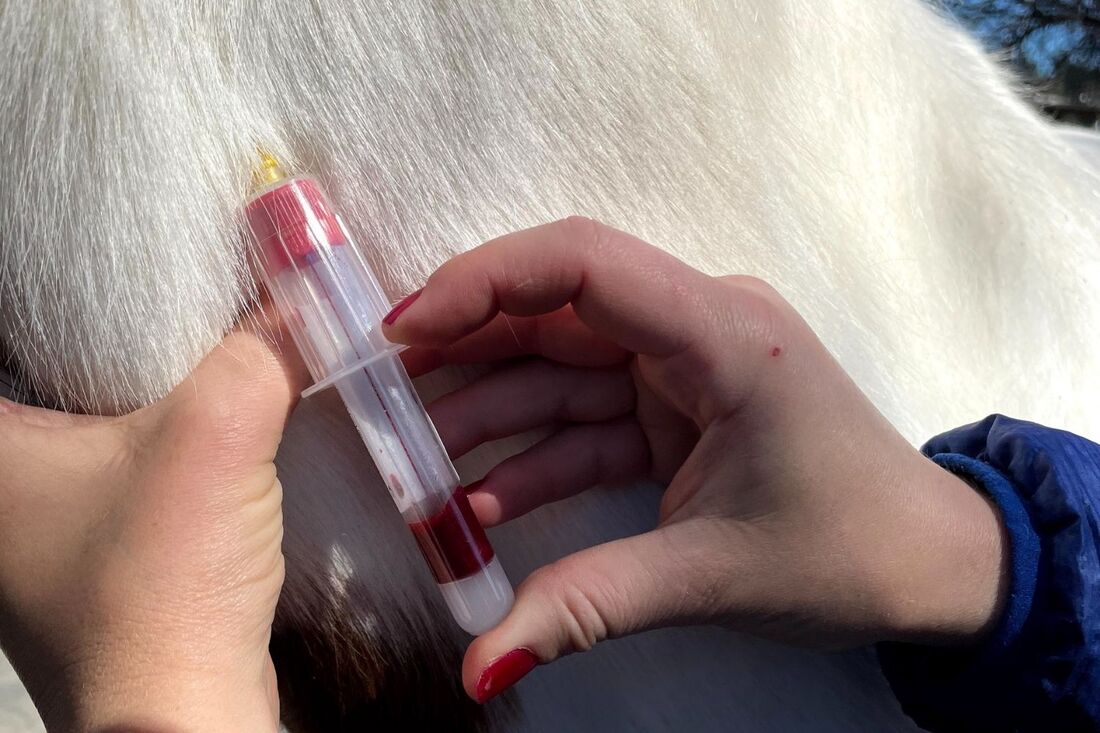|
You may have heard about Equine Cushing’s Disease (more specifically, Pituitary Pars Intermedia Dysfunction, PPID) or Equine Metabolic Syndrome (EMS), but what are they exactly, and how will they affect your horse if diagnosed? The following is an introduction to these two conditions. Equine Cushing’s DiseasePPID is the most common endocrine disorder in equines. It most often affects older horses but has been observed in some younger than ten years of age. In cases of PPID, the hypothalamus and pituitary gland fail to communicate appropriately. This failure of typical communication results in the pituitary gland becoming hyperactive, producing various hormones circulating through the body abnormally. The pituitary hormone routinely measured for diagnosis of PPID is adrenocorticotropic hormone (ACTH). Depending on the time of year, sometimes ACTH levels are measured after a small dose of thyrotropin-releasing hormone (TRH) that will stimulate the abnormal pituitary cells to secrete more ACTH. TRH Stimulation tests are useful in diagnosing the disease in the early stages. Elevated levels of various hormones in a PPID horse can cause many changes, some visible, some not, and can vary in severity in each horse. Some of these changes include: - Poor performance or lethargy - Changes in coat: long or wavy hair, failure to shed hair fully each spring - Hoof inflammation (laminitis), sometimes with associated hoof abscesses - Propensity to infections or delayed healing - Loss of muscle mass typically noticed over the back and hindquarters, as well as a “pot-bellied” appearance - Excess or inappropriate sweating - Increased water intake and urination - Infertility or abnormal heat cycles in mares While PPID is not curable, both medical and daily management changes can reduce the condition’s signs and symptoms. The most appropriate medication is pergolide, a dopamine receptor agonist. It helps decrease some of the hormone production by the pituitary gland. Other essential components of PPID management are the maintenance of excellent husbandry and general health care. Close attention to nutrition, vaccination, deworming, medical treatment, and horses’ hoof care is recommended. Equine Metabolic Syndrome (EMS)EMS is characterized by insulin dysregulation and resistance. Causes of EMS onset include genetics, diet, environment, and, sometimes, coexisting PPID. Breed predispositions to EMS include many pony and mini breeds, Saddlebreds, Morgans, and Paso finos. Horses may be an “easy keeper,” not seemingly requiring as much feed as their friends. Diet can also play a role, including a high-sugar-content diet or suddenly increased access to lush, fresh grass. Clinically, these horses may appear overweight and most commonly show “regional adiposity,” Fat deposition occurs at the neck, shoulder, and above the tail head. Because of the increased circulating insulin levels, EMS horses are also at increased risk for foot soreness and laminitis, which can be extremely painful and devastating to the horse if not addressed. Testing involves a thorough physical exam and blood tests to ascertain insulin levels and glucose, leptin, and thyroid levels. Starwood submits its bloodwork for PPID and EMS to Cornell, leading researchers in the field who have developed a comprehensive panel to diagnose both conditions. The mainstay of treatment for EMS is nutritional management and weight loss. If diagnosed, your veterinarian may recommend transitioning hay and grain sources to brands with lower starch content. Sometimes, your veterinarian may also recommend medications to accelerate weight loss and sensitize the body to insulin again. Exercise is also essential to promote weight loss as long as the horse remains comfortable on its feet. If your horse is also diagnosed with PPID, treatment with pergolide may improve the signs of EMS. Early recognition of these conditions and regular veterinary care is critical for a good quality of life. If you wish for further information about either of these conditions or are interested in getting your horse tested, please contact Starwood Equine.
2 Comments
6/20/2021 07:53:24 pm
Thank you for sharing this about horse health care tips I learned a lot from this article. I hope you will post more content about horse health. By the way, Wanna share my experience about using Food Supplements for Horses product from France (Genuine Haarlem Oil). Their products are very effective and good for horse health. You can try it also. Thanks!
Reply
9/20/2023 11:23:51 pm
I want to express my gratitude for your insightful post on endocrine and metabolic conditions in horses. It's crucial information for any horse owner, and you've presented it in an easy-to-understand manner. Your dedication to equine health is commendable. I couldn't help but wonder if you've come across the benefits of the <a href="https://centerlinedistribution.net">best horse calming supplement</a> for horses dealing with metabolic issues—it could provide them with the much-needed calmness during their health journey. Thank you for sharing your expertise and helping us better care for our equine companions.
Reply
Leave a Reply. |
Topics
All
Archives
May 2021
|
Privacy Policy | Copyright © 2019 Starwood Equine Veterinary Services, Inc. All rights reserved.


 RSS Feed
RSS Feed